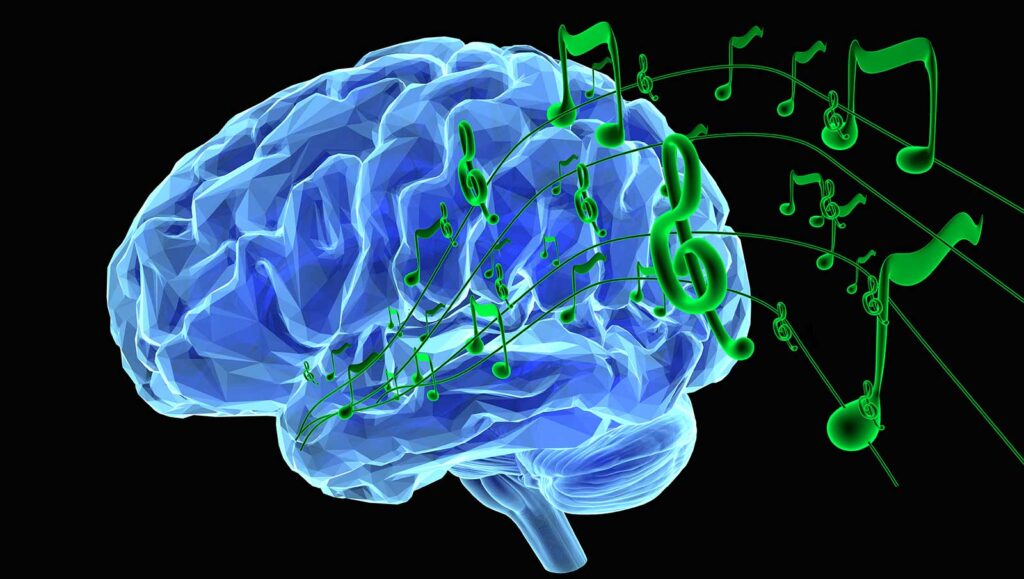American artist Billy Joel famously observed, “I think music in itself is healing. It’s a powerful manifestation of humanity. It is something that affects us all. Everyone likes music, regardless of their cultural background. This is something that most of us would heartily concur with, and it is this global interest in music’s healing potential that has prompted researchers to study it.”
We have a such a strong relationship to music because it is ‘hardwired’ in our minds and bodies. Each of us can name at least one song that makes us feel something when we hear it. It can be a song that played during your first dance at your wedding, or it might be a song that brings back memories for you.
Many of us have an innate understanding of how music affects our energy and mood. For this reason, play sad love songs after a breakup. You might have Spotify playlists created just for special events, or you might just like to listen to your favorite music on a regular basis. In either case, the manner you listen to music can benefit your wellbeing in general.
Given our strong bond with music, it may not come as a surprise that multiple studies have found it to be good for our mental health. According to studies, music therapy may be an effective way to cure depression because it boosts the brain’s production of dopamine, a neurotransmitter that improves mood.
And earlier this year, MNT covered a study indicating that listening to hip-hop music, especially that of Kendrick Lamar, may aid people in understanding mental health conditions. The study was published in The Lancet Psychiatry. But more and more scientists are discovering that music may have numerous health advantages for your body, mind, and soul that go far beyond mental health. It can enhance memory, focus, and learning. It can ease pain and improve physical performance.
Benefits of Music
The brain processes all of our human senses, including hearing. In particular as we age, keeping the brain active by exercising it in a number of ways can preserve brain function. This is why one of the things that can improve brain health is listening to music.
How Music influences the Brain

1. It Stimulates the majority of the Brain’s Regions
Almost every area and network of your brain is activated by music. Additionally, it improves the connections between various brain regions. This covers the departments in charge of: emotions, memory, learning, well-being, cognitive function, including focus and concentration, quality of life and movement.
2. It improves Intellect, Memory, and Learning
A study on the impact of music on cognitive abilities found that listening to relaxing background music may enhance cognition. Cognitive exercises were given to students both with and without music. Those who had music playing finished more tasks and correctly answered more questions.
But there is a catch. The researchers advise listening to soothing music like smooth jazz or classical because they think that style of music matters. According to other research, listening to good music might enhance learning and memory. This could be because repeating music encourages our brains to create patterns that strengthen our memory. While not everyone finds music to be helpful for studying or trying to remember information, many people do.
Finally, a study indicated that singing words helped language learners retain them better than speaking normally or even rhythmically.
3. It helps your Brain age gracefully
Conditions like Alzheimer’s disease and other forms of dementia can benefit from music therapy. Music therapy frequently helps older persons with these illnesses. People with dementia can benefit from music by having better cognition and regaining lost memories. Patients with Alzheimer’s disease may experience agitation, anxiety, or hallucinations. Studies have discovered that music helps ease these symptoms and improve communication.
4. It Enhances Creativity
One of our best traits as humans is our capacity for creativity. It not only enables us to produce art, but also aids in problem-solving and the development of superior goods and services. Since practically every role requires it, it is a key ability. Apparently, one study suggested that listening to happy music — such as arousing or uplifting classical music — can enhance your creativity.
Music’s Positive Effects on Mental Health

1. It Aids in Mood Regulation
The amount of the stress hormone cortisol decreases as you listen to music. Dopamine, the hormone associated with rewards, is also increased, which can aid in improving your mood. The amygdala, a region of the brain, is in charge of digesting music. It serves as the focal point of our emotions and mood.
Because of this, listening to cheerful music can make you feel happier. As a result, regular listening to upbeat music can assist maintain a healthy brain chemistry. You may be able to maintain better emotional and mental balance as a result.
2. It Lessens Stress
Using music to control your cortisol levels can help you feel less stressed and more grounded. Acute stress and chronic stress are two examples of the various types of stress. A certain degree of acute stress may be advantageous depending on the circumstances as it aids in problem-solving.
When stress persists over time, it becomes a problem. Hormonal abnormalities result from prolonged stress. Headaches, sleeplessness, and other physical issues may result from this. Regularly listening to music can help to reduce acute stress and keep it from developing into chronic stress.
3. It might Inspire you Greatly
In one study, scientists wanted to see if music affected how motivated bikers on static bikes were. Without the participants’ knowledge, they altered the music’s tempo to accomplish this. The cyclists’ performance improved in terms of distance traveled, pedaling speed, and power used when the tempo was raised by 10%. The opposite result was obtained by slowing down the music by 10%. This shows that the faster music motivated them more.
4. It Alleviates Depression and Anxiety
In the US, anxiety affects about 40 million persons. Nearly half of them also experience depression. If you are one of them, you might want to think about using music in addition to any prescribed medical therapies.
This is due to the dopamine that listening to music releases. This hormone stimulates the pleasure and reward areas in your brain. Regular dopamine hits can lessen the signs and symptoms of anxiety and sadness.
Music’s Beneficial Effects on Physical Health

1. It Maintains Heart Health
According to research, listening to calming music helps drop blood pressure and slow down heart rate. As blood can flow more easily as a result, this helps to maintain heart health. In fact, according to one study, music therapy may potentially increase the effectiveness of blood pressure medication.
2. It Strengthens your Immunity
By modulating our hormones, music listening has long been known to reduce stress and promote states of relaxation. Our immunity can suffer as a result of stress hormones (think about how you often get sick following a period of stress). However, listening to music while you’re stressed out will balance your hormones. Your immune system will work at its best as a result.
3. It can help you eat less
Your eating habits may change if you are listening to music. According to one study, patrons of a fast-food restaurant with calming background music and subdued lighting consumed 18% fewer calories than the control group.
Contrarily, another study discovered that listening to rapid music makes people eat more quickly. This indicates that those who desire to practice mindful or intuitive eating can benefit from music.
4. It Improves Enduring Power
Numerous studies have demonstrated that listening to upbeat music while exercising can increase your physical endurance and performance. There are primarily two justifications for this. The first is that upbeat music makes you feel more energized. This promotes performance by increasing blood flow. The second is that when you feel like you’ve reached your physical breaking point, music can give you the willpower and determination you need to keep going.
5. It Controls the Nerve System
The two basic modes of your nervous system are “fight or flight” and “rest and digest.” One can only be activated at once. When we encounter challenging circumstances, the fight or flight reaction is intended to activate. The nervous system returns to its default rest and digest mode once the stressor has subsided.
However, the pressures of our hectic lives can upset this delicate balance and overwhelm your body with excess stress chemicals. By lowering stress hormones and releasing reward and relaxation hormones, listening to music can trigger the rest and digest response.
6. It Improves your Sleep Quality
The calming effects of music are naturally understood by many people. You’re not alone if you already listen to music to aid in sleep or to treat insomnia. In one study, it was discovered that students who listened to classical music before bedtime slept better than those who listened to audiobooks or did nothing. This means that a routine for good sleep hygiene can include music.
Your personal musical preferences will determine the genre of music that soothes you the most. However, some music uses particular frequencies and binaural beats to promote deep relaxation.
7. It Reduces Pain
According to numerous studies, listening to music helps reduce pain for those who are recovering from surgery or receiving geriatric care, for instance. This may be because it provides the patient’s brain with an additional input to focus on, aiding in the patient’s ability to block out the pain. The calming effects of music may also aid in reducing or managing pain. Due to this, music therapy is frequently employed as a pain management strategy.
Benefits of Various Musical Genres
You may be wondering at this point how to use music to your advantage in various circumstances. Here is a list of the top five musical genres for health.
1. Benefits of Classical Music
As we have already shown, listening to classical music has a variety of positive effects on the brain and body. You can improve your relaxation, focus, memory, and cognition, for instance.
But it can also have some unexpected advantages, including lowering crime. In London, railway stations have begun to play classical music. After 18 months, there had been a reduction in staff attacks by 25%, robberies by 33%, and vandalism by 37%..
2. Benefits of Rap Music
Rap music frequently depicts tales of individuals succeeding despite great odds or overcoming challenges. According to research, listening to motivational stories, like those in rap music, can help people combat depression.
3. Benefits of Pop Music
Rock or pop music, in particular, can boost endurance and physical performance while exercising, according to a different study on the relationship between music and physical performance. Pop and rock can also help lift the mood of those who enjoy listening to them because many of the advantages of music depend on the preferences of the listener.
4. Benefits of Heavy Metal Music
Metal music enthusiasts, according to one study, have a strong sense of identity. As a result, heavy metal music may be beneficial for you if you want to increase your self-confidence.
5. Benefits of Jazz Music
Smooth jazz or other calming music can cause your brain to go into an alpha-wave state. Smooth jazz is one of the best ways to unwind after a long day because these waves happen when you are alert but at ease.
There is unquestionably proof that we have a much deeper relationship to music than merely an emotional one, according to the study conducted to date. So, the next time your favorite song comes on, dance around a little while knowing that you will probably be getting some health benefits.
